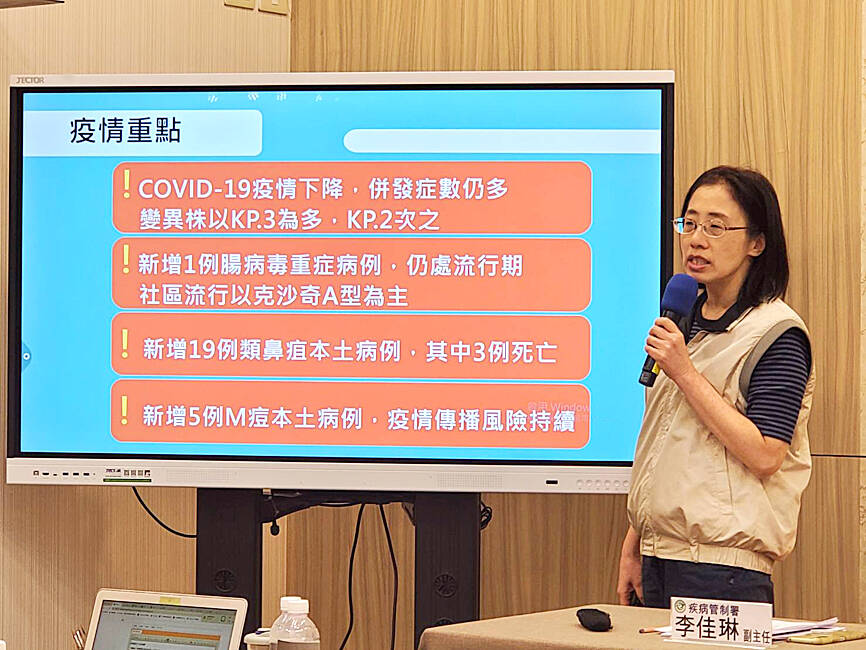Nineteen cases of locally acquired melioidosis were reported last week, bringing the total this year to 37, with 30 of these cases having been reported after Typhoon Gaemi swept over Taiwan last month, the Centers for Disease Control (CDC) said yesterday.
The 19 cases of melioidosis — a bacterial infection that is spread through contact with contaminated soil, water or air, with cases often increasing after a typhoon — ranged in age from 20 to 90, CDC Epidemic Intelligence Center Deputy Director Lee Chia-lin (李佳琳) said.
Fifteen of those who fell ill were in Kaohsiung, in addition to two each in Tainan and Taichung, Lee said.

Photo: Lin Hui-chin, Taipei Times
They began exhibiting symptoms between July 27 and Wednesday last week, and seven of them had direct exposure to dirty water or dirt, Lee said.
A total of 37 local cases, including five deaths, have been reported this year, the most for the same period in a decade, Lee said.
Three of the deaths were reported last week.
All three people who died had underlying health conditions, and developed pneumonia or went into septic shock after infection and died within 15 days after the onset of symptoms, CDC physician Wu Hao-hsin (鄔豪欣) said.
One of them was an 89-year-old bedridden woman with neuromuscular disease, who was rushed to a hospital due to difficulty breathing and low blood oxygen levels, he said.
She had no vital signs when she arrived at the hospital, and the bacteria that cause melioidosis were found in her blood after she died, he added.
Another case was a 54-year-old woman with a hematologic disease who had respiratory problems and was rushed to a hospital after experiencing heart palpitations, cold sweat and shock, and died one day after hospitalization, he said.
The third case was a 65-year-old man with diabetes, who developed a fever and pneumonia, and died 10 days after hospitalization, he added.
As of press time last night, 14 of the cases were still in hospital for treatment, including two in intensive care, CDC data showed.
CDC Deputy Director-General Philip Lo (羅一鈞) said that among the 30 local cases reported after Gaemi struck Taiwan, the majority were middle-aged to elderly adults who have chronic diseases.
A significant increase in melioidosis cases usually occurs within nine days after a typhoon, so weekly numbers are likely to go down this week, Lo said.
However, as some people develop symptoms later or delay seeking treatment, cases could still be reported until the end of the month, he said.
Lo urged people, especially those with underlying health conditions, to pay attention to their health and seek medical attention if they develop suspected symptoms.
In related news, Lee said a case of severe complications from enterovirus infection was reported last week — a 10-month-old baby who had received two doses of the enterovirus A71 vaccine, but was found to be infected with Coxsackievirus A2.
Lo said the vaccine has a very high efficacy against enterovirus A71, the most severe neurotoxic enterovirus, but does not provide cross-protection against other types of enteroviruses, so taking personal preventive measures are important.
Weekly hospital visits for enterovirus have been declining, but there were still 11,381 visits last week, exceeding the epidemic threshold, and a total of five serious cases have been reported this year, Lee said.
In addition, five cases of mpox were reported last week, Lo said.
With 15 cases reported last month and nine this month, the risk of infection would continue to increase this summer, as more social gatherings and parties are held, Lo said, urging eligible recipients to get fully vaccinated.
The WHO’s emergency committee is to hold a meeting today to decide whether to declare an international emergency over the outbreak of a deadlier and more transmissible type of mpox called “clade 1b,” which was first reported in the Democratic Republic of the Congo and spread to several other African countries, he added.

Trips for more than 100,000 international and domestic air travelers could be disrupted as China launches a military exercise around Taiwan today, Taiwan’s Civil Aviation Administration (CAA) said yesterday. The exercise could affect nearly 900 flights scheduled to enter the Taipei Flight Information Region (FIR) during the exercise window, it added. A notice issued by the Chinese Civil Aviation Administration showed there would be seven temporary zones around the Taiwan Strait which would be used for live-fire exercises, lasting from 8am to 6pm today. All aircraft are prohibited from entering during exercise, it says. Taipei FIR has 14 international air routes and

The Ministry of National Defense (MND) today released images of the military tracking China’s People's Liberation Army (PLA) movements during the latest round of Chinese drills around Taiwan. The PLA began "Justice Mission 2025" drills today, carrying out live-fire drills, simulated strikes on land and maritime targets, and exercises to blockade the nation's main ports. The exercises are to continue tomorrow, with the PLA announcing sea and air space restrictions for five zones around Taiwan for 10 hours starting from 8:30am. The ministry today released images showing a Chinese J-16 fighter jet tracked by a F-16V Block 20 jet and the

Snow fell on Yushan (Jade Mountain, 玉山) yesterday morning as a continental cold air mass sent temperatures below freezing on Taiwan’s tallest peak, the Central Weather Administration (CWA) said. Snowflakes were seen on Yushan’s north peak from 6:28am to 6:38am, but they did not fully cover the ground and no accumulation was recorded, the CWA said. As of 7:42am, the lowest temperature recorded across Taiwan was minus-5.5°C at Yushan’s Fengkou observatory and minus-4.7°C at the Yushan observatory, CWA data showed. On Hehuanshan (合歡山) in Nantou County, a low of 1.3°C was recorded at 6:39pm, when ice pellets fell at Songsyue Lodge (松雪樓), a

NO SHAME IN RETREAT: Hikers should consider turning back if the weather turns bad or if they do not have sufficient equipment, the Taroko park headquarters said Two people died of hypothermia over the weekend while hiking on Hsuehshan (雪山), prompting park authorities to remind hikers to bring proper equipment and consider their physical condition before setting out in the cold weather. Temperatures dropped over the weekend, bringing snow to high altitudes in Shei-pa National Park. One hiker, surnamed Lin (林), who on Friday was traveling with a group of six along the Hsuehshan west ridge trail, lost consciousness due to hypothermia and died, the Shei-pa National Park Headquarters said. On Saturday, another hiker, surnamed Tien (田), in a group of five on the southeast of the west